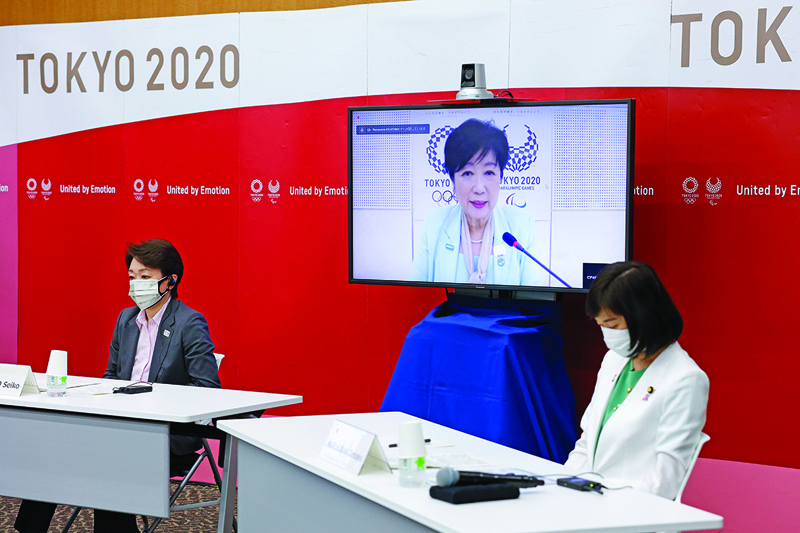 TOKYO: (From left) Seiko Hashimoto, President of Tokyo 2020, Tokyo Governor Yuriko Koike (on screen) and Tamayo Marukawa, Minister for the Tokyo Olympic and Paralympic Games, speak during a five-party meeting at Harumi Island Triton Square Tower Y in Tokyo yesterday. – AFP
TOKYO: (From left) Seiko Hashimoto, President of Tokyo 2020, Tokyo Governor Yuriko Koike (on screen) and Tamayo Marukawa, Minister for the Tokyo Olympic and Paralympic Games, speak during a five-party meeting at Harumi Island Triton Square Tower Y in Tokyo yesterday. – AFP
TOKYO: Up to 10,000 fans will be allowed at Tokyo Olympic events, organizers said yesterday, warning competition could move behind closed doors if infections surge. The decision, just weeks before the opening ceremony, ends months of speculation about whether domestic spectators would be able to attend the pandemic-postponed Games. Overseas fans were banned in March.
A lottery will determine which existing ticket-holders can attend a Games that will be unlike any other, with cheering banned, masks mandatory, and fans told to go straight home after the competition. "In light of the government's restrictions on public events, the spectator limit for the Olympic Games will be set at 50 percent of venue capacity, up to a maximum of 10,000 people in all venues," organizers said in a statement.
A decision on spectators at the Paralympics will be delayed until July 16, a week before the Olympics open. And officials left open the possibility of a reversal if the virus rebounds. Tokyo was under a coronavirus state of emergency until Sunday. "If there should be major dramatic change in the infection situation, we may need to revisit this matter amongst ourselves and we may need to consider the option of having no spectators in the venues," Tokyo Governor Yuriko Koike said.
Senior medical experts, including top advisors to the government, have said holding the Games behind closed doors would be "ideal" from a health perspective. They fear crowds of fans could fuel a new surge in infections in a country still racing to vaccinate its residents. Organizers said it was unlikely that negative virus tests would be required to attend.
International Olympic Committee chief Thomas Bach, speaking before the announcement, said he was "absolutely sure that it will be a decision to best protect the Japanese people and all participants". There will be some wiggle room on the cap, with organizers allowing sponsors and others dubbed "stakeholders" to attend above the 10,000 limit.
They said those spectators would travel separately from the public and pose less of a virus risk, but declined to specify how many people would come under that group. School children invited as part of a special program also won't count towards the cap. "People still talk about what they saw at the first Tokyo Olympics. That's how memorable this event is. We want to offer the same experience to children," Tokyo 2020 CEO Toshiro Muto said.
Revenue slashed
The decision means Tokyo 2020 needs to take back 910,000 of 3.64 million tickets currently held by domestic fans. Organizers said limiting spectators would cut projected ticket revenues by about 50 percent. And even those limited numbers of fans could be kept out if the virus surges. Japan has seen a comparatively small virus outbreak, with nearly 14,500 deaths, despite avoiding the harsh lockdowns seen elsewhere. But the vaccine rollout has been slower than in many developed countries, only picking up speed in recent days. Around 6.5 percent of the population is now fully vaccinated.
Polls in Japan have regularly shown most Japanese would prefer to see the Games delayed further or cancelled altogether. But recent surveys suggest a softening of opposition, with more in favor of holding the Games than cancelling it -- if postponement is not offered as an option. A survey published Monday found around a third of respondents want the Games to happen, up from 14 percent last month, though a majority still prefer further delay or cancellation.
Organizers say strict rules will keep both athletes and the public safe, and Bach said yesterday that "well over" 80 percent of people staying in the Olympic Village will be vaccinated. Athletes will be barred from contact with the public and risk being kicked out of the Games if they violate rules including mask-wearing and daily virus tests. In a taste of the complexities ahead, a coach from Uganda's Olympic team tested positive on arrival in Japan on Saturday. The team was reportedly all vaccinated and would have had to test negative before travel to Japan. - AFP




